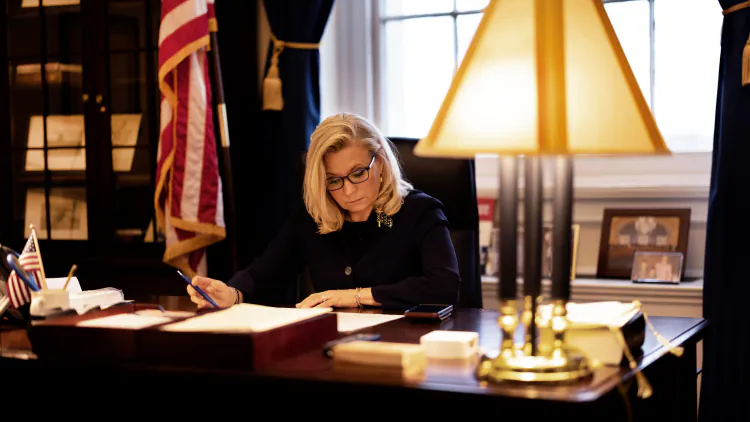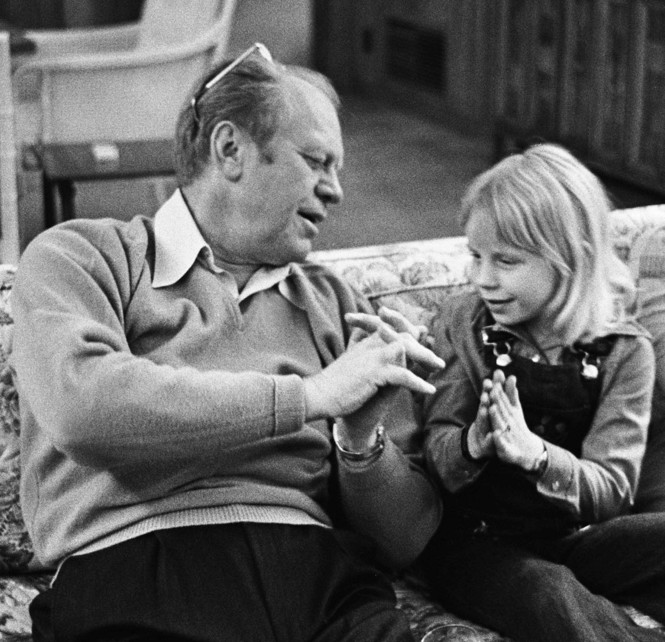The Danger of a Small Act of Cowardice
I resigned from the Ford presidential foundation over its refusal to honor Liz Cheney. But my decision was bigger than that.

The first time I photographed Gerald Ford, he was a day away from being nominated as vice president, after Spiro Agnew had resigned in disgrace. The portrait I made ran on the cover of Time, a first for both of us. Ford was my assignment, then he became my friend. As president, he appointed me, at age 27, as his chief White House photographer, granting me total access. The more I got to know him, the more I admired his humanity and empathy. I remained close to him and his wife, Betty, until the end of their lives. And I was honored to serve as a trustee on the board of the Gerald R. Ford Presidential Foundation for more than 20 years.
On April 9, however, I resigned from that position. It was over a matter that might seem trivial on the surface, but that I believe constituted another step in America’s retreat from democracy—the failure of an institution bearing the name of one of our most honorable presidents to stand in the way of authoritarianism.
Each year, the foundation awards its Gerald R. Ford Medal for Distinguished Public Service, recognizing an individual who embodies Ford’s high ideals: integrity, honesty, candor, strength of character, determination in the face of adversity, among other attributes. Past winners have included John Paul Stevens, George H. W. Bush, Jimmy Carter, Colin Powell, and Bob and Elizabeth Dole. This year, in my capacity as a trustee, I pushed hard for former Representative Liz Cheney to receive the recognition.
After the January 6 insurrection, Cheney famously helped lead the push to impeach President Donald Trump. “The President of the United States summoned this mob, assembled the mob, and lit the flame of this attack,” she wrote in a statement a few days after the riot. “There has never been a greater betrayal by a President of the United States of his office and his oath to the Constitution.” Four months later, she was stripped of her House leadership position by an ungrateful and angry Republican caucus. A month and a half later, she joined the House select committee investigating January 6; she soon was named co-chair. The next year, Trump got his revenge: Cheney was defeated in her Wyoming primary by a rival he had backed.
Despite this—and numerous death threats—Cheney has been unwavering in standing against Trump and the risk his 2024 candidacy represents.
[Mark Leibovich: Liz Cheney, the Republican from the state of reality]
Cheney is a friend of mine; I have known her since she was 8 years old and have photographed and spent time with her and her family for decades. But I wasn’t alone in my thinking: Many of my fellow trustees also believed she clearly deserved the recognition. Ford himself would have been delighted by the selection. He first met Cheney when she was a little girl, and her father, future Vice President Dick Cheney, was Ford’s chief of staff. (Cheney herself is a trustee of the foundation in good standing, but several other trustees have received the award in the past.)
(David Hume Kennerly / Center for Creative Photography / The University of Arizona)
Yet when the foundation’s executive committee received Cheney’s nomination, its members denied her the award. Instead, they offered it first to a former president, who did not accept, and then to another well-known person, who also declined. When the door briefly reopened for more nominations, I made another passionate pitch for Cheney. The committee passed on her again, ultimately deciding to give the award to former Indiana Governor Mitch Daniels, whose last job as a public servant ended more than a decade ago.
To me, the decision was inexplicable; Cheney obviously had been more deserving. Sensing that the foundation’s executive committee no longer shared my principles, I resigned from the board, as I wrote in a letter to my fellow trustees.
Shortly after that letter was published by Politico, the foundation’s executive director, Gleaves Whitney, issued a public statement explaining the committee’s decision and confirming what I had heard from fellow trustees: “At the time the award was being discussed, it was publicly reported that Liz was under active consideration for a presidential run. Exercising its fiduciary responsibility, the executive committee concluded that giving the Ford medal to Liz in the 2024 election cycle might be construed as a political statement and thus expose the Foundation to the legal risk of losing its nonprofit status with the Internal Revenue Service.”
Giving the award to Cheney, Whitney said, would not be “prudent.” Translation: The foundation was afraid. In another statement, Whitney said that Cheney could be considered for the award in the future. That was not only totally embarrassing, but too late.
I believe the foundation did what it did because of the same pressures hollowing out many Republican institutions and weakening many conservative leaders across America—the fear of retaliation from the forces of Trumpism, forces that deeply loathe Cheney and the values she represents. Fear that president No. 45 might become No. 47. Fear that wealthy donors might be on Trump’s team overtly or covertly and might withhold money from the foundation. Fear of phantom circumstances.
[Read the January/February 2024 issue: If Trump wins]
I see Whitney’s legalistic tap dance as a cop-out. Cheney has not announced that she is running; she hasn’t been a candidate for any elective office since she lost her primary two years ago. What’s more, in 2004, the foundation gave its annual recognition to then–Vice President Cheney while he was an active candidate for a second term. In a recent letter to trustees, Whitney wrote, correctly, “We face a very different political environment today than in 2004.” He added that, in 2006, the IRS had cracked down on nonprofits supporting political candidates. But again, Cheney is not a political candidate. Two years ago, the John F. Kennedy Library Foundation wasn’t afraid to pay her tribute with its Profile in Courage Award (granted jointly to her, Ukrainian President Volodymyr Zelensky, and three others).
Mitch Daniels might seem like a safe choice for the recognition, a moderate in the mold of Ford. But he has shown none of the valor that Cheney has in confronting Trump. Despite acknowledging that Joe Biden won the 2020 election, Daniels has made only tepid comments about the threat Trump presents to democracy. In 2022, for example, The Bulwark’s Mona Charen asked Daniels about a recent warning from President Biden that American democracy was in danger of being subverted by election-denying “MAGA Republicans.” Daniels said he had spent 10 years “ducking” such questions. He allowed that he would “make no objection” to Biden’s statement, but continued: “I think there are anti-democratic tendencies across our political spectrum, or at least at both ends of it.” This was classic both-sides-ism. To me, Daniels in that moment exemplified the kind of passive Republican who is laying brick on the Trump highway to an autocracy.
My resignation is about more than giving one valiant person an award. America is where it is today because of all the people and organizations that have committed small acts of cowardice like that of the Ford presidential foundation’s executive committee. I wanted to draw attention to those in the political center and on the right who know better, who have real power and influence, who rail against Trump behind closed doors, yet who appear in public with their lips zipped. They might think of themselves as patriots, but in fact they are allowing our country to be driven toward tyranny. Every now and then, you should listen to your heart and not the lawyers.
Ultimately, the foundation has tarnished the image of its namesake. I was in the East Room of the White House 50 years ago on that hot day of August 9, 1974, when President Ford declared, “Our long national nightmare is over.” It was a great moment for America, and a bold statement from the new president, acknowledging that Richard Nixon’s actions had threatened the Constitution. Ford could not have envisioned the threat to democracy that America now faces. But he would have been encouraged by a bright light named Liz Cheney—someone who is fighting hard, sometimes alone, for the Constitution that Ford defended just as courageously.
What's Your Reaction?




















